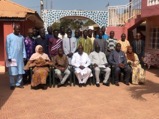
Speaking during the event held at the Baobab Holiday Resort, Hassan Saidou Gaye, the deputy permanent secretary at the Ministry of Trade, explained that the importance of national and international standards has increased with the globalisation of the world economy.
He added that standards facilitate trade through the removal of non-tariff barriers and achieving worldwide accessibility to facilitate trade at cross borders.
“Gambia is not an island anymore; we are part of a global village and the wider AfCFTA community. Not two million people as before but part of 1.3 billion people of the African continent. In order to effectively trade and export what we produce, we need standards and universally accepted standards,” he said.
Looking at both national and international standards, he stated that standards have increased and the World Trade Organisation technical director recognizes the need to develop standards and set up conformity assessment activities that include but are not limited to accreditation to facilitate trade, bring equal results and enable recognition of conformity assessment activities nationally, regionally and internationally.
“Today, Gambia is opportune to access many markets, not only the AfCFTA market but the EU, Chinese and our readmission to the American market. These are all opportunities for market access,” he added.
DPS Gaye continued that his ministry tries to promote the country as a hub to access the international market while adding that his ministry will continue to create an environment conducive by trying to improve the country’s businesses and attract the required investment so that some of The Gambia’s products will be exported.
Sariyang Jobarteh, director of the Department of Agriculture, also emphasised that maize is an important crop and they are doing what they could to increase the volume and the production. He said they are using high-yield seeds that can produce a lot yield than the traditional ones.
He added that they have to consider looking around at the value chain of maize with regard to the composition of demand and supply in the country.
“Most of the foods consumed are rice, maize and others. We believed that in terms of demands analysis with regard to the value chain of maize, there should be very important statistics and records on the national demand estimation, estimated impact on the animal feed industry, the characteristic and the requirements of the bias of this crop,” he noted.
He explained that all have to be analysed in order to address the value chain issues surrounding maize production.
Jobarteh said in terms of supply, they have the firm belief that they should have analysis and production potential for maize.
Ebrima Jallow of the Standards Bureau said his institution is a government department established by an act of parliament in 2010 mandated to stabilize all products and services produced or consumed in the country.
In achieving their mandate, he stated that the bureau established three divisions ranging from the standardization, to conformity assessment and methodology divisions.
“Currently we are using pans, cups and sand to measure. By these, our farmers are being cheated and our methodology division will make sure we move from such measurements,” he assured.





